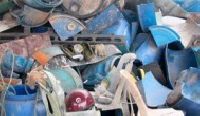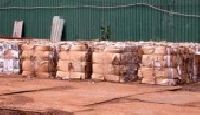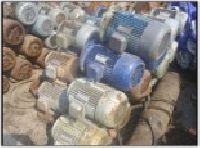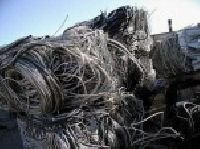Welcome to Recycle Link Trading
Manufacturer / Exporter / Supplier Of Scrap Aluminium, Scrap Paper, ScrapPlastic, e-waste
-
Year of Establishment
2007
-
Primary Business
Supplier
-
Number of Employees
1 - 5
Welcome to Recycle Link Trading
Manufacturer / Exporter / Supplier Of Scrap Aluminium, Scrap Paper, ScrapPlastic, e-waste

Year of Establishment
2007

Primary Business
Supplier

Number of Employees
1 - 5

Plastic is a man-made material composed of carbon and hydrogen molecules. Plastic molecules are so tightly bound together that decomposer organisms such as bacteria and fungi cannot penetrate them and therefore, they do not biodegrade. Plastics will eventually disintegrate if exposed to sunlight and oxygen for an extended period of time (probably hundreds of years) through a process called photo-oxidation, but since these conditions are lacking in landfill sites plastics (and other materials) cannot be expected to break down. Plastic is a very useful material due to its stability, versatility and light weight, and is used for a very broad range of applications. Recycling of plastic packaging has evolved over the years and is based on the collection, sorting and processing of predominantly homogeneous streams of plastic packaging. This approach maximizes the value and market availability for the collected plastic packaging. Some examples of recycling in consumer packaging include products such as: plastic bottles, plastic tubs, and plastic films and bags. These products can all be recycled. The choice as to whether they are recycled or not depends on each individual municipality.

Unlike the process of making paper from virgin materials, making paper from waste paper rarely requires chemical pre-treatment. The waste paper is mixed with water in a machine that looks like giant blender and converted into a thin slurry of individual fibres. This slurry is treated to remove contaminants such as plastic, string and paper clips using sophisticated screening techniques. It is then made into paper in the same way as making paper from virgin material. According to the Industry Commission, there are some limitations to paper recycling. "Paper can be recycled into a wide variety of paper and other cellulose products. Contamination problems limit its reuse in food packaging such as milk cartons, and the degradation of fibres (during recycling) mean that used paper is generally 'down graded' as it is recycled. Thus, old newspapers cannot be used to produce high quality printing and writing papers, but they can be used in applications requiring mechanical pulp, such as newsprint and tissue." The degradation of fibres during recycling also limits the number of times that a particular paper fibre can be recycled. Adding some virgin fibre or good quality waste fibres to the recycled pulp can improve the quality of the recycled product.

The term e-waste is applied to all waste from or caused by electronics, which is often toxic waste. It is a major concern with respect to wireless technology and computers, which are readily discarded due to rapid technological change, low initial cost and planned obsolescence. Various solutions including recycling, re-use and the standardization of technologies for less rapid obsolecence are applied. Types of e-waste: Appliances IT equipment entertainment equipment telecommunications equipment data, audio and video media Disposal of computers, printers, scanners and other telecommunications equipment - called "e-waste" - has emerged as a major environmental issue. E-waste contains toxic materials that can be hazardous if not managed properly. In particular, the lead oxide used in the cathode ray tubes (CRTs) of computer monitors is a concern because it is in a soluble form. Proper recycling of the hazardous materials from computers is an important health and safety concern. However, computer waste also contains valuable parts and precious metals, such as gold and copper, which offer potential business opportunities. Manufacturers are trying to remove hazardous substances such as lead and mercury from computers. For example, the lead in solder will likely be phased out over the next five years. However, there are major challenges. Lead-free solders tend to be more brittle than the current lead-based solders used to glue components to motherboards. In addition, changing the solder requires the cooperation of all component manufacturers. Everything works together. If even one of the hundreds of components on a motherboard is dislodged, functioning of the computer is compromised.

Aluminium cans that have been collected for recycling are first sorted and then baled into bricks. The bricks are transported to processing plants where they are fed into rotary furnaces and the aluminium heated to about 7000C. The molten aluminium is then cast into ingots that are sent to rolling mills where they are remade into new cans. In some cases, the recycled cans are reprocessed into other aluminium products.
Share your thoughts with other customers for Recycle Link Trading
Add Review